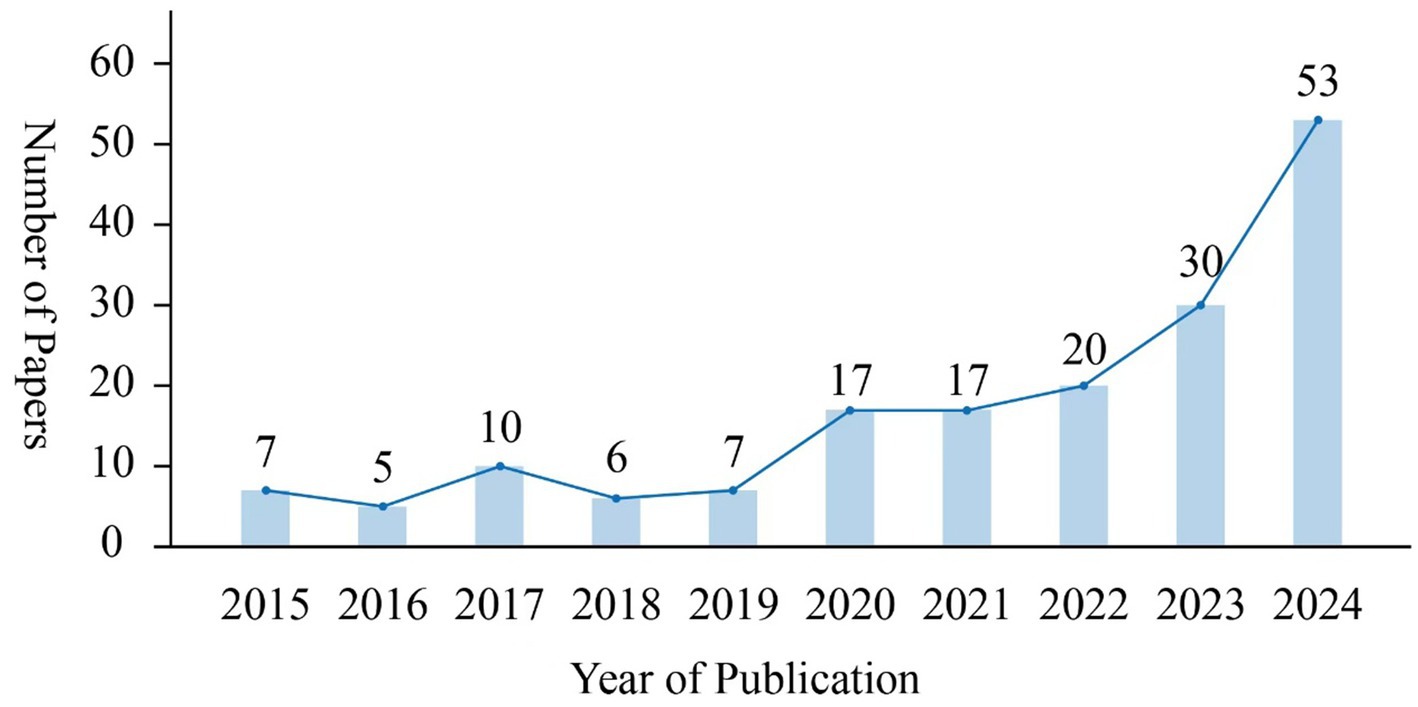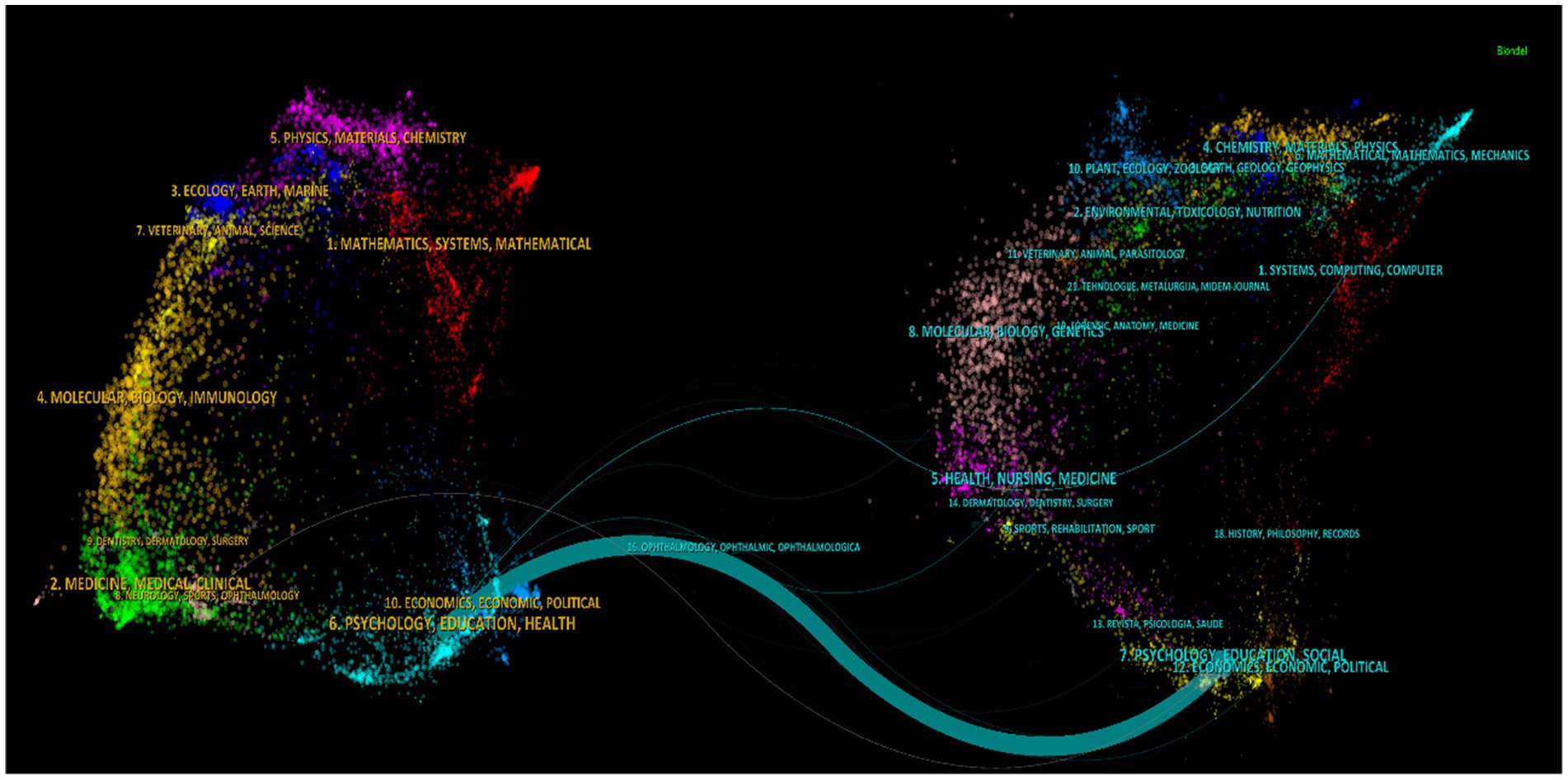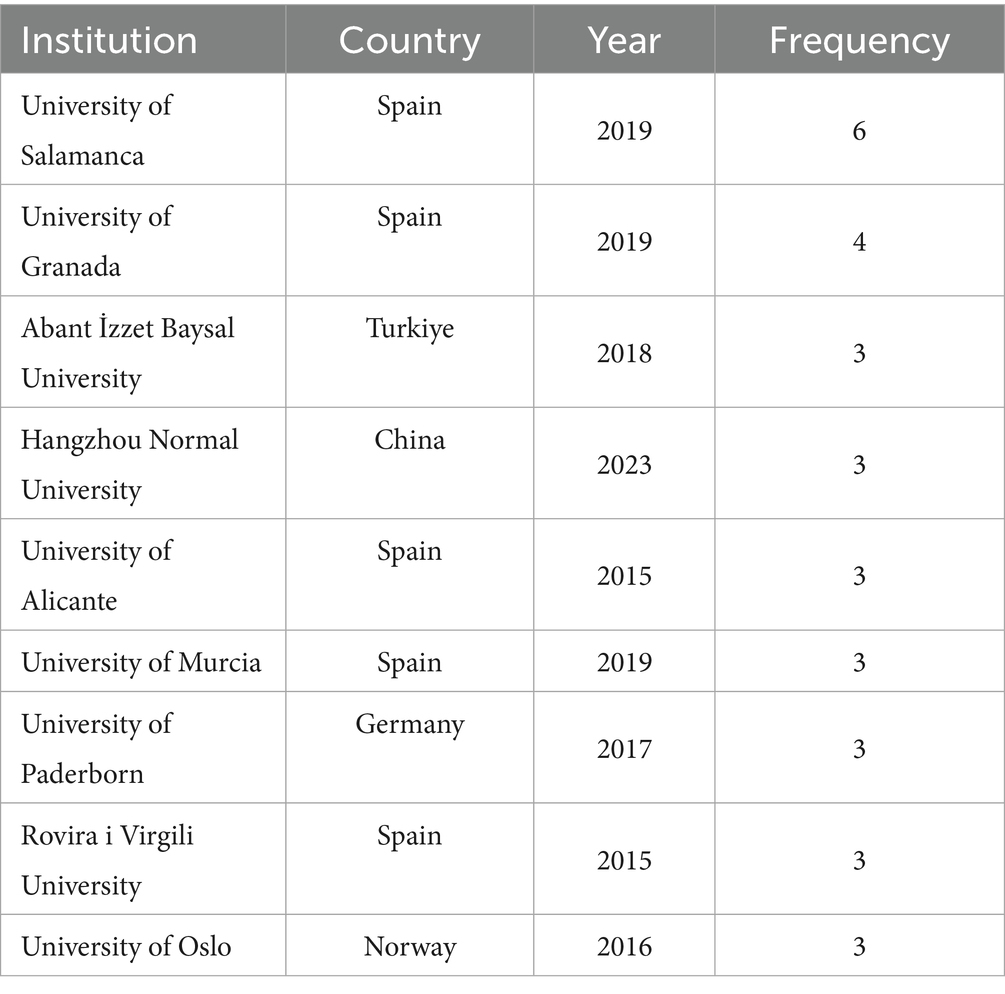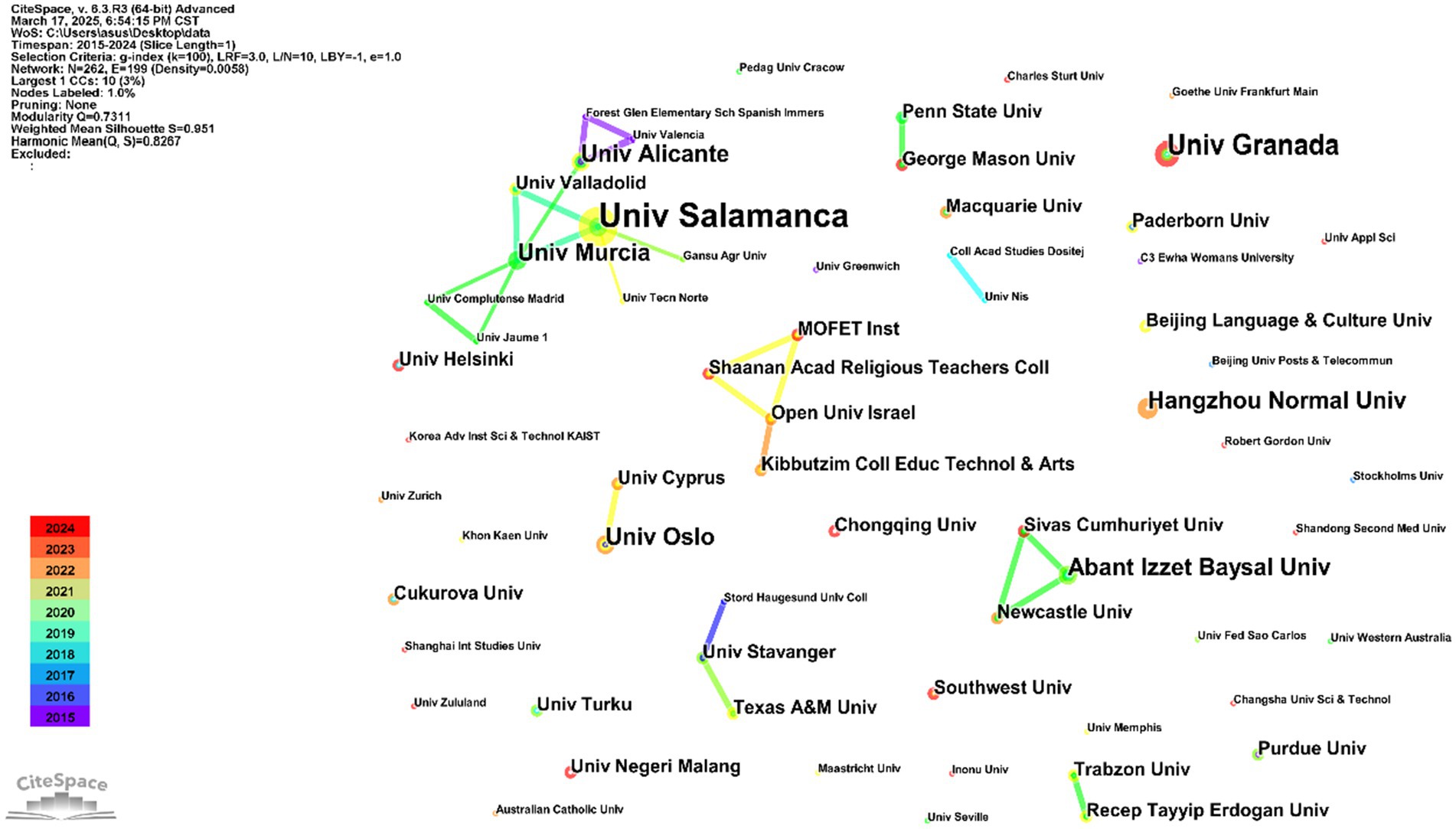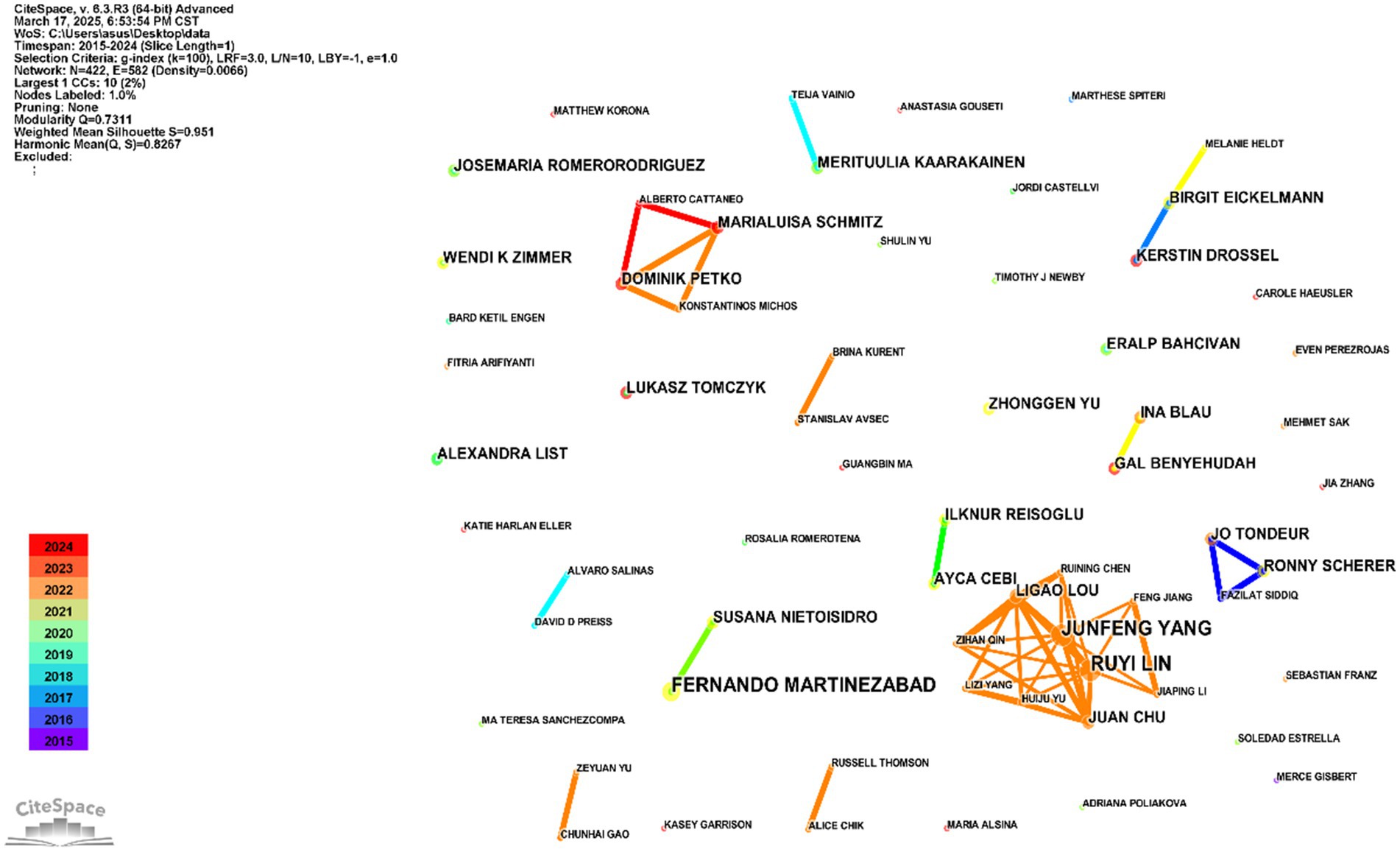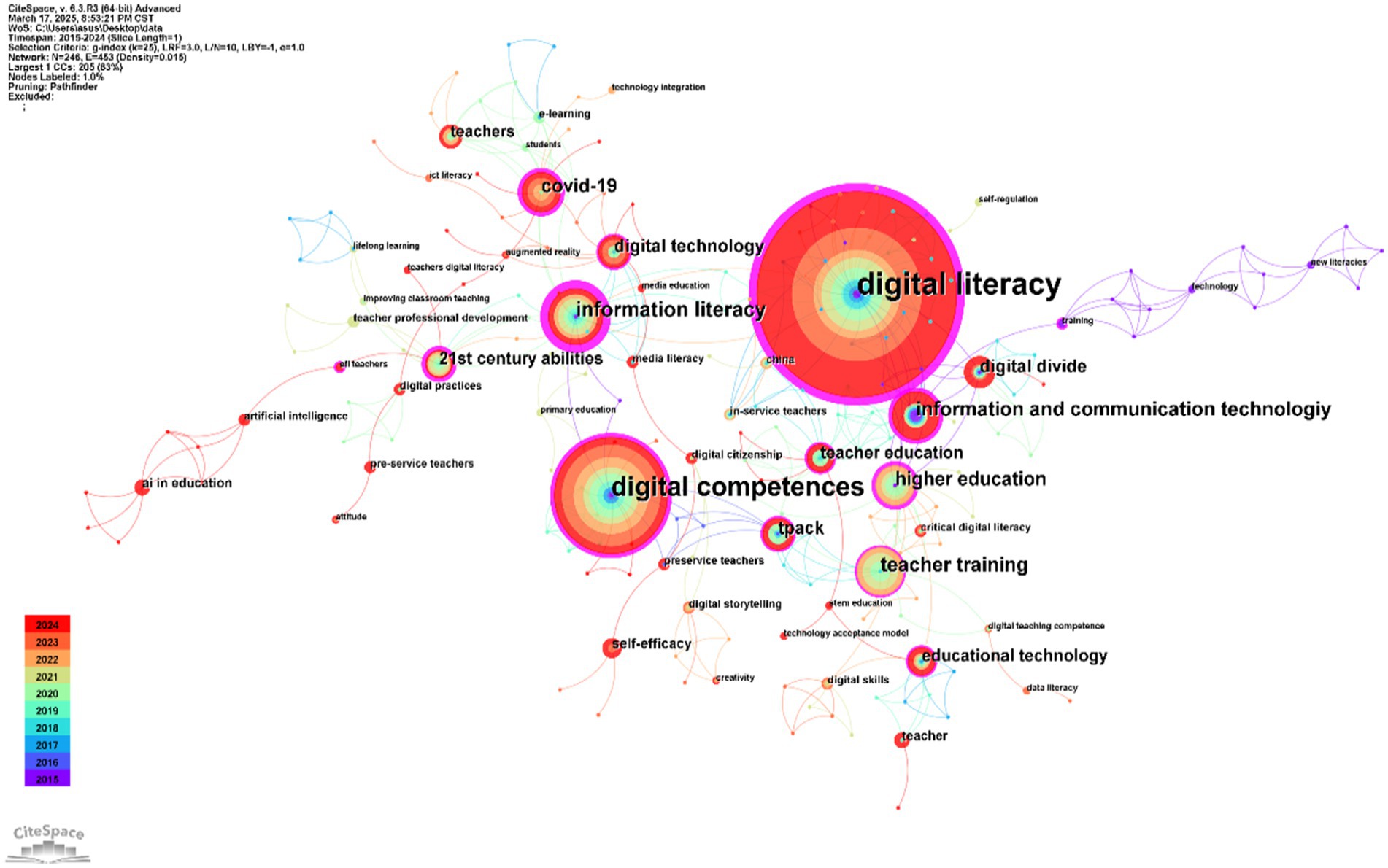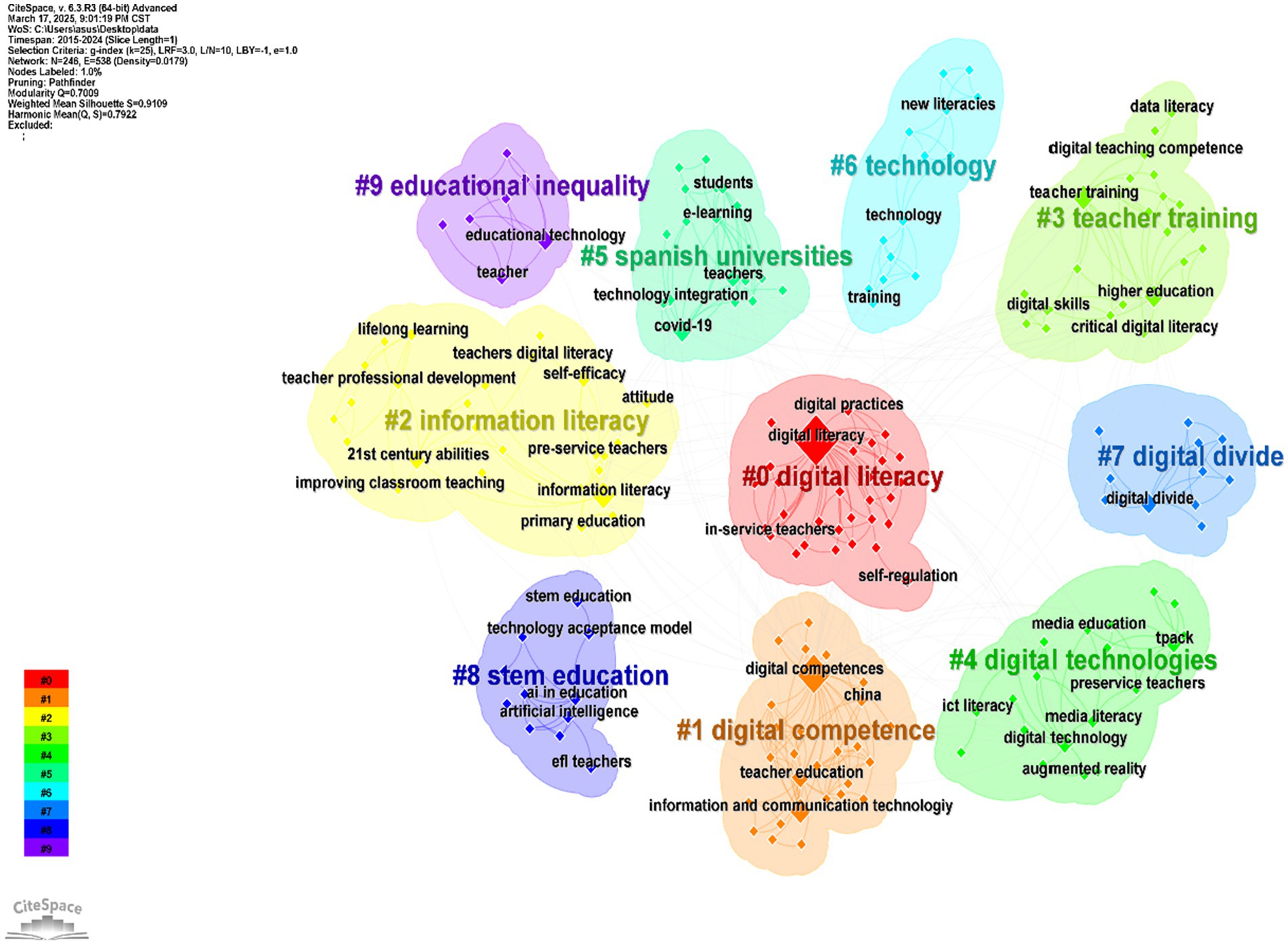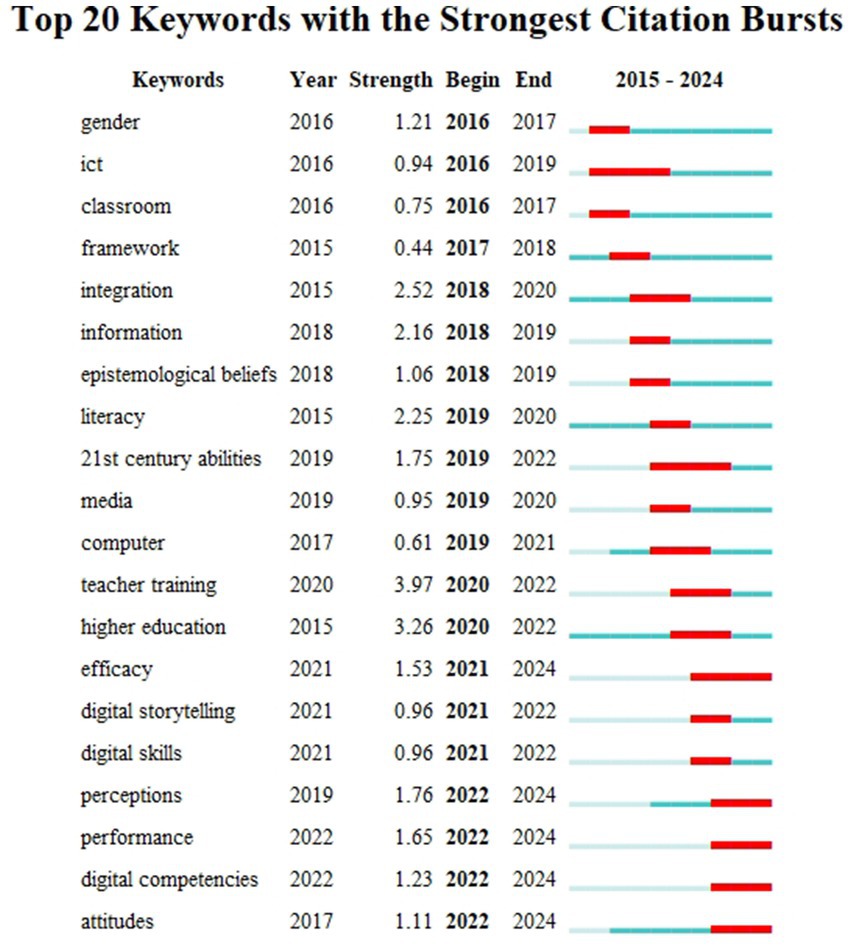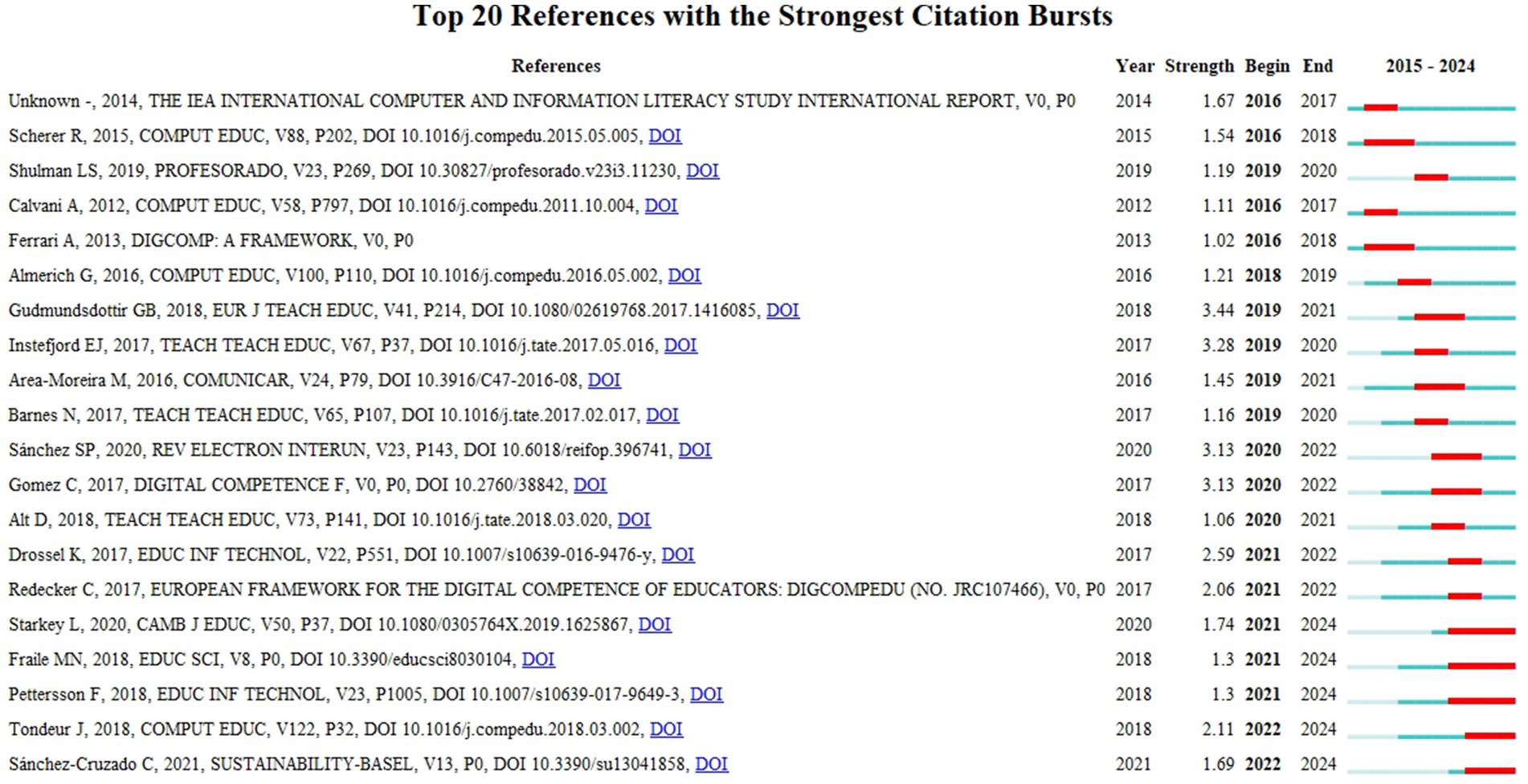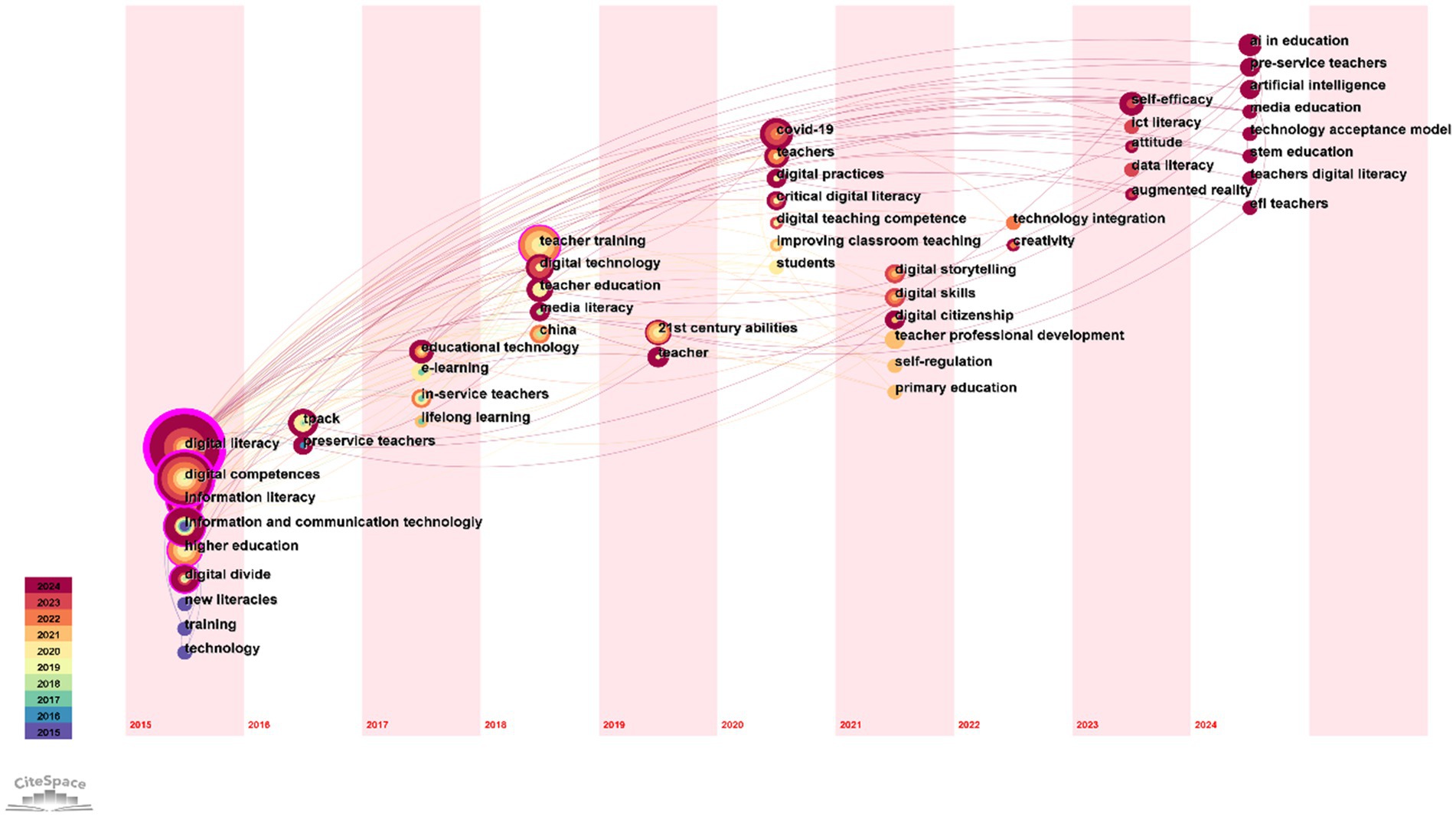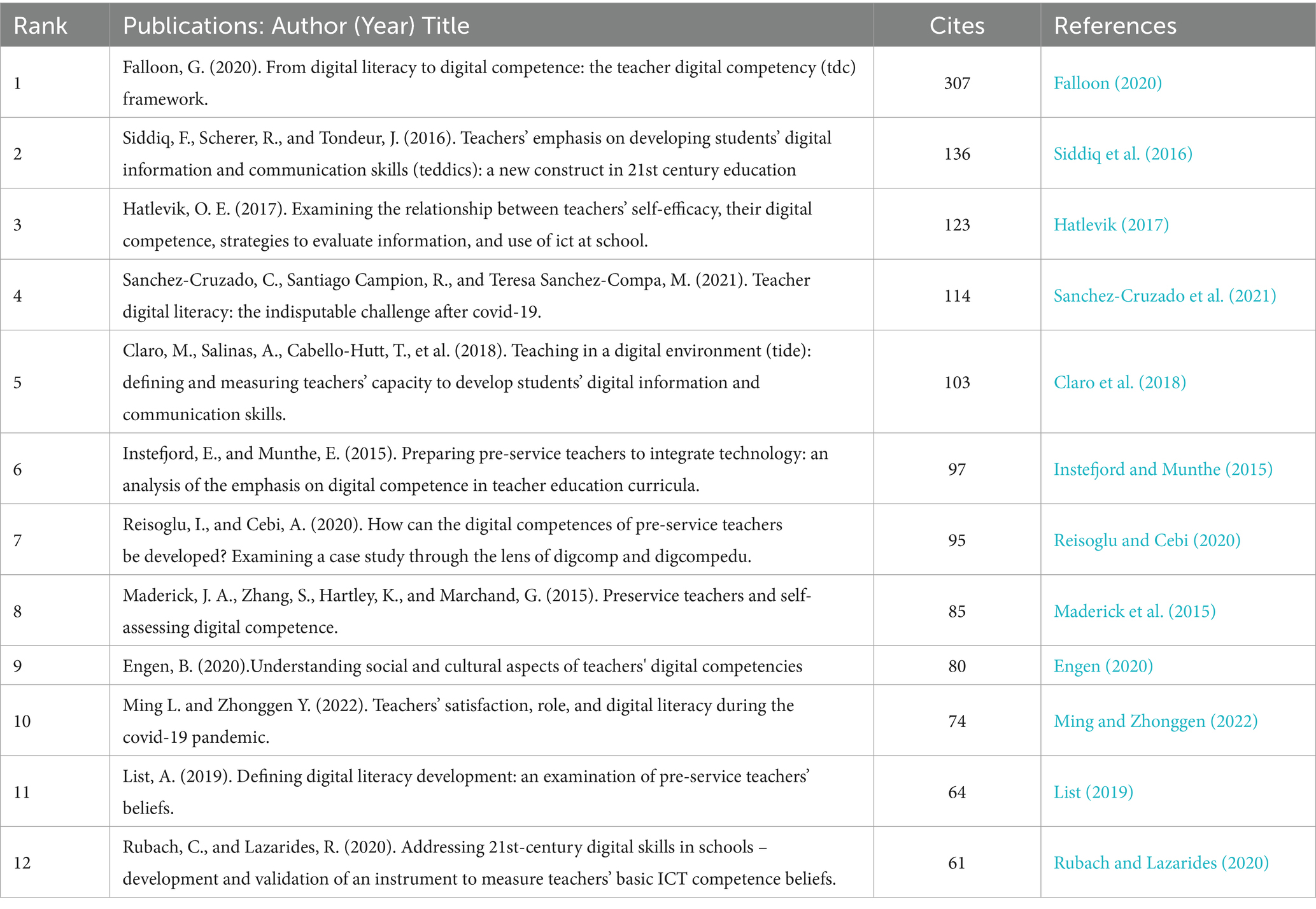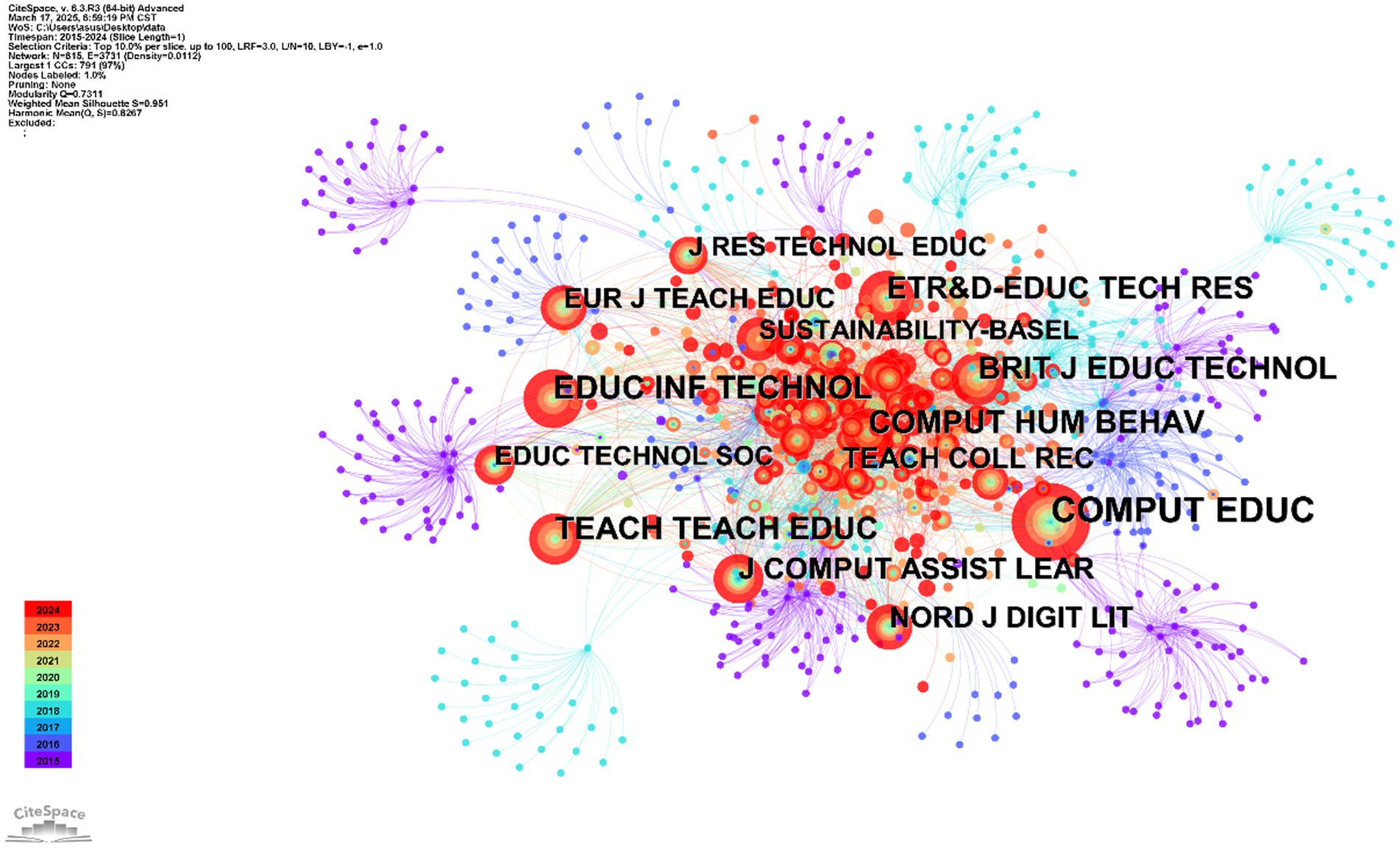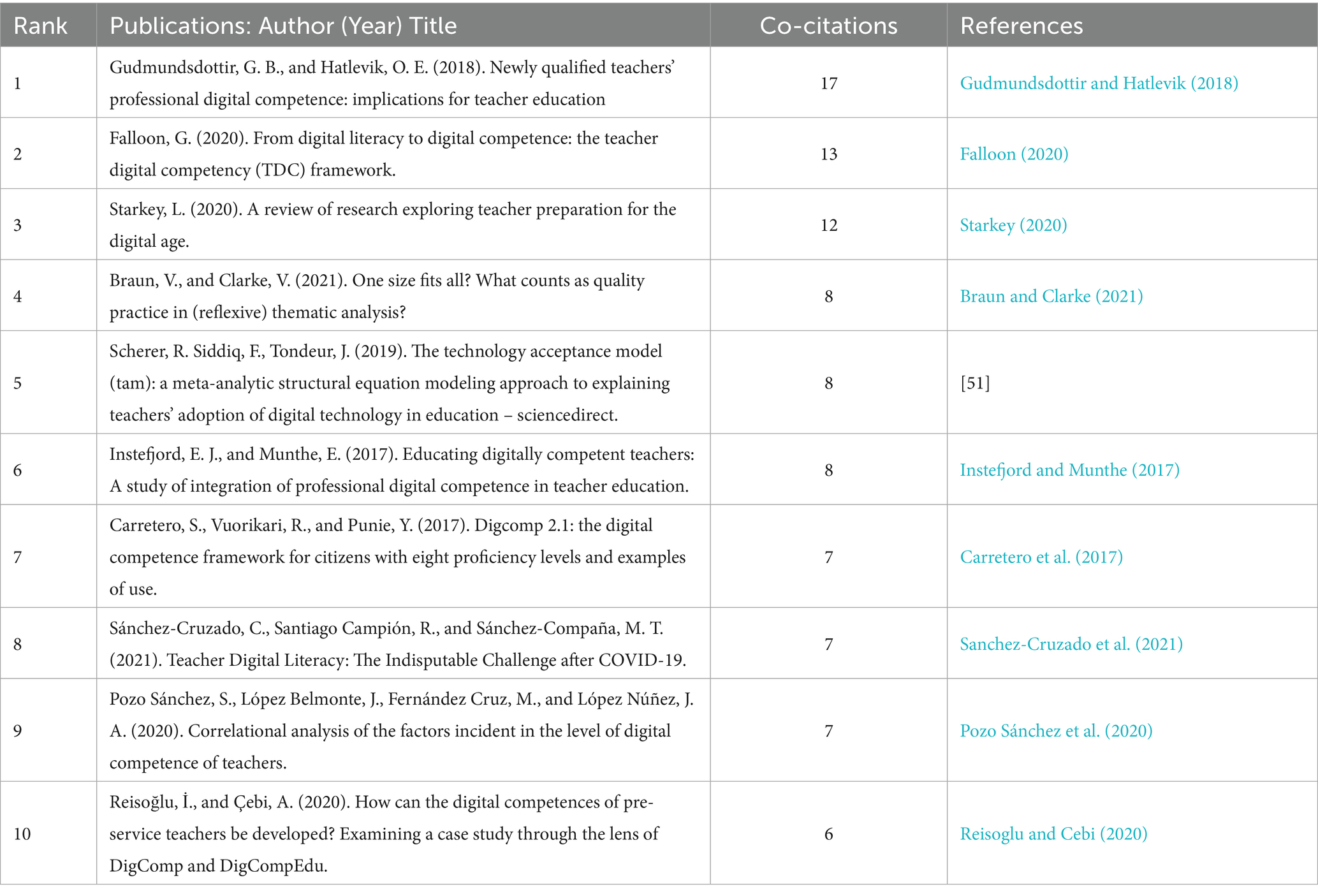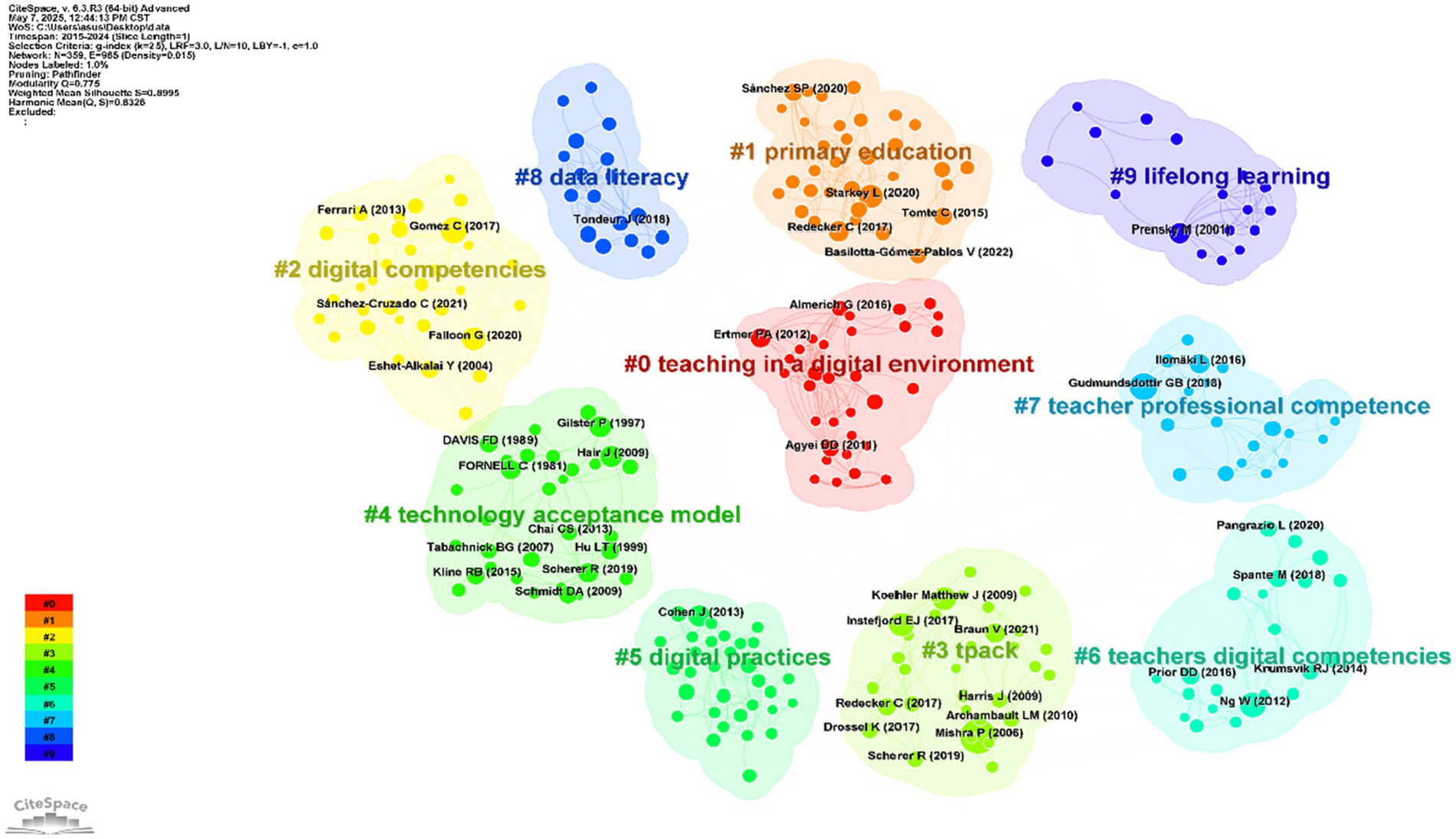- 1Human Resources Department, Nanjing University of Finance & Economics, Nanjing, China
- 2School of Nursing, Nanjing University of Chinese Medicine, Nanjing, China
This study employs CiteSpace software to conduct a scientific, quantitative, and visual analysis of 169 research articles on teachers’ digital literacy indexed in the Web of Science Core Collection from 2015 to 2024. Aimed at addressing the fragmentation and lack of systematic integration within the field, this analysis reveals the underlying knowledge structure and the evolution of global research, thereby enhancing the theoretical foundation for the digital transformation of education. Utilizing bibliometric methods and visualization techniques, the study identifies interdisciplinary topics such as teacher professional development, digital equity, and STEM education innovation. Highly cited literature emphasizes the construction of conceptual frameworks such as TPACK and the development of assessment tools, while empirical studies predominantly adopt mixed methods to investigate the relationship between technology acceptance and teaching practice. Research frontiers have progressed from basic digital skills training to deeper integration of technology, highlighting the need for competency-based and systematic educational reform. The findings outline key directions for teacher training design, policy coordination, and interdisciplinary collaboration, offering a basis for narrowing the digital divide and reshaping the educational landscape. Furthermore, the results provide empirical support for educational institutions to establish digital literacy standards and enhance strategies for technology integration, thereby advancing both academic discourse and practical efforts in educational digital transformation.
1 Introduction
In the digital age, digital literacy has become a crucial driver of social innovation. It represents a core competency that citizens must possess in order to bridge the digital divide and knowledge gap, thereby facilitating the achievement of sustainable development goals (Drenoyianni et al., 2008; Vanfossen and Berson, 2008; Sharma, 2018). The concept of digital literacy encompasses multiple dimensions, including: technical skills such as operating smart devices and utilizing digital tools; cognitive abilities for critically evaluating and effectively filtering digital information; and ethical awareness involving norms of online behavior and data security practices (Panel, 2002; Hartley, 2011; Feerrar, 2019). Its core elements can be summarized as follows: proficient use of intelligent terminals and digital platforms for productive and daily activities; data analysis capabilities to evaluate the authenticity of information and construct knowledge frameworks; effective use of collaborative tools to achieve digital interaction across temporal and spatial boundaries; adherence to privacy protection protocols and principles of digital citizenship; and the ability to create and disseminate digital content.
With the transformation of education driven by technologies such as artificial intelligence and big data, the structure of educational delivery is undergoing significant changes. Emerging models, such as cloud-based classrooms, blended instruction, and ubiquitous learning, are redefining teaching environments. Integrating digital competence into educational systems is essential to fostering a sustainable and effective teaching framework and reconfiguring the role of teachers as “digital education designers” (Alabdulaziz, 2021; Osorio and Banzato, 2022; Licen and Prosen, 2024). To adapt to this shift, teachers are required to develop a matrix of digital literacy competencies: at the technological application level, they must master digital resource development, intelligent evaluation systems, and digital curriculum design; in instructional design, competencies include multimodal resource integration, planning of personalized learning paths, and data-driven precision teaching; and in ethical norms, it is critical to construct robust cybersecurity protocols and practice ethical principles of digital education (Casey and Bruce, 2011; Anna and Richard, 2013; Saklaki and Gardikiotis, 2024; Wang and Baek, 2023).
Digital literacy plays a pivotal role in teachers’ professional development. Studies have shown that teachers’ digital literacy significantly influences their flexibility and practical knowledge (Hyang and Rim, 2023), and it contributes to improved job performance (Lyu and Luo, 2024). It also affects teachers’ sense of self-efficacy and levels of occupational burnout (Febliza et al., 2023; Yao and Wang, 2024; Yang and Lou, 2024). Furthermore, teachers’ digital literacy and their ability to teach digitally enhance students’ classroom engagement and learning outcomes (Lin et al., 2022). However, existing research presents three key gaps: (1) most studies focus on isolated dimensions of digital literacy without offering holistic frameworks that integrate technological, pedagogical, and ethical competencies; (2) there is a lack of longitudinal and cross-cultural research on the development of digital literacy in various educational contexts; and (3) few studies systematically map the intellectual structure and emerging trends in this field, resulting in both theoretical and practical fragmentation. Enhancing teachers’ digital literacy not only improves instructional efficiency but also serves as a strategic lever for driving the digital transformation of education and establishing a smart education ecosystem. This issue has significant theoretical and practical implications for advancing the quality of education (Hall et al., 2014; Pesha, 2022). Consequently, increasing attention has been devoted to research on evaluation systems, training pathways, and the developmental mechanisms of teachers’ digital literacy.
This research is of particular relevance to various stakeholders. For educators and school administrators, it provides insights into competency gaps and informs the design of targeted professional development initiatives. Policymakers may draw upon these findings to formulate national strategies for digital education and optimize resource distribution. Teacher training institutions can design their curriculum around with evolving competency demands. Ultimately, improved digital literacy among teachers will enhance instructional quality and digital learning experiences for students, while contributing to broader goals of educational equity and workforce preparedness in the digital economy.
By applying scientometric methods and visualization tools to analyze representative studies in this field, it is possible to trace research trajectories, monitor hotspots, and uncover emerging themes, knowledge structures, critical shifts, and thematic patterns. This approach offers valuable insights into the citation network and intellectual base, providing meaningful references for advancing future research (Chen, 2004; Chen, 2006; Williams, 2015). The present study aims to achieve three objectives: (1) to identify the evolutionary trajectory and intellectual foundations of research on teachers’ digital literacy over the past decade; (2) to reveal current research frontiers and areas that require further investigation; and (3) to construct a comprehensive knowledge map that integrates technological, pedagogical, and ethical dimensions of digital literacy, thereby offering a conceptual framework for future theoretical development and competency evaluation. By systematically integrating research from the past decade, this study elucidates the knowledge structure and developmental trajectory of global research on teachers’ digital literacy and provides theoretical support for advancing the digital transformation of education.
2 Data and methods
2.1 Literature search
According to Bradford’s Law, core scholarly contributions in a given discipline are typically concentrated in a limited number of high-impact journals, which collectively provide a comprehensive overview of the field (Bradford, 1934). The Web of Science (WOS), one of the most widely utilized citation index databases globally, offers access to a broad range of disciplines. Its core indices include the Science Citation Index (SCI), Social Sciences Citation Index (SSCI), Arts and Humanities Citation Index (AHCI), and Emerging Sources Citation Index (ESCI), covering high-quality, peer-reviewed publications across the natural sciences, engineering, social sciences, arts, and humanities.
In this study, the core collection of the WOS was selected as the data source. Literature on the theme of teachers’ information literacy was retrieved for scientometric analysis. The subject search terms were carefully constructed to include relevant fields in the title, abstract, keywords, and Keywords Plus. The main search terms used were “digital literacy” and “teacher,” supplemented by extended keywords such as “information and communication technologies digital,” “information literacy digital,” “instructional technology strategies,” and “new literacies digital,” to broaden the scope. The search was limited to the document type “article,” with the publication date range set from January 1, 2015, to December 31, 2024. The retrieval was conducted on March 12, 2025.
2.2 Literature screening
Inclusion criteria were as follows: (1) The research population consisted of teachers, including preschool, primary, secondary, university, vocational, medical, librarian, preservice, and future teachers. (2) The topic was focused on digital literacy and information literacy. (3) The literature was published in English. Exclusion criteria involved the following conditions: (1) Publications that had been withdrawn. (2) Studies that focused on students, citizens, youth, or other non-teacher populations. (3) Literature not directly related to digital literacy, such as those primarily focused on health literacy, civic literacy, assessment literacy, research literacy, scientific literacy, or feedback literacy. (4) Publications not written in English. Based on this search strategy, a total of 994 articles were retrieved. Initially, withdrawn publications were removed. The remaining records were then screened according to the predefined inclusion and exclusion criteria. Titles and abstracts were examined first, followed by full-text reviews where necessary to assess relevance to the research objectives. Ultimately, 169 articles met the criteria and were included in the study. The selection was performed by the first author and subsequently reviewed and validated by the second author.
2.3 Tools and methods
The analysis was conducted using CiteSpace, a visualization software developed by Dr. Chaomei Chen at Drexel University in collaboration with the WISE Laboratory of Dalian University of Technology. Operated on a Java platform, CiteSpace is widely applied to identify developmental trends, collaboration networks, and research frontiers within a specific academic field. Through co-citation analysis, the software reveals the underlying knowledge base and thematic evolution of scholarly research (Chen, 2004; Chen, 2006). The 6.3.R3 Advanced version of CiteSpace was used in this study.
The selected literature was exported from WOS in plain text format, including full records and cited references. The analysis time span was set from 2015 to 2024. The g-index was used as the selection criterion during time slicing, with K = 25. Atlas clipping was not applied. Key parameters for analysis included authors, institutions, countries, keywords, and references, all of which were subjected to co-occurrence analysis. After configuring thresholds, fonts, and node parameters, a series of visual maps was generated to illustrate the development trends, core contributors, thematic shifts, knowledge structure, and intellectual landscape of research on teachers’ digital literacy over the past decade.
3 Results
3.1 Publication years and paper volume
The annual distribution of publications serves as a key indicator for evaluating and forecasting research trends in a given field. After completing the retrieval and screening processes, a total of 169 research articles on teachers’ digital literacy published between 2015 and 2024 were identified in the WOS Core Collection.
As illustrated in Figure 1, the number of publications has shown an upward trend over the past decade. Notably, 2020 represents a significant turning point in the field’s development trajectory. The period from 2015 to 2019 reflects the early exploratory phase, characterized by a relatively limited number of publications. In contrast, the period from 2020 to 2024 witnessed a surge in publication output, indicating that the research has entered a phase of rapid development and intensified scholarly interest.
3.2 Dual-map overlay
A dual-map overlay, generated using CiteSpace, visualizes the relationship between citing and cited journals by superimposing two maps. This technique enables researchers to explore the interdisciplinary knowledge flow and interaction patterns among different domains (Chen and Leydesdorff, 2013).
As shown in Figure 2, the map on the left represents the citing journals, while the map on the right depicts the cited journals. The arcs connecting the two sides illustrate citation paths. The overlay reveals that the primary knowledge sources in teachers’ digital literacy research are concentrated in the fields of computer science, educational technology, and psychology. These disciplinary intersections highlight the interdisciplinary nature of the research and suggest that educational technology is deeply informed by both computational and behavioral sciences.
3.3 Countries, institutions, and authors
Based on node analysis for “Country,” 13 countries each published more than five papers on the topic. The top contributors are: China (28), Spain (25), USA (18), Turkey (13), Germany (10), Australia (9), Norway (8), England (7), South Korea (7), Sweden (7), Israel (6), and Finland (5).
When using “Institution” as a node, Table 1 lists the top nine institutions with the highest number of publications. The institution co-occurrence network, depicted in Figure 3, visualizes the relationships between these entities. Node size represents the volume of publications, while link strength indicates institutional collaboration. The results reveal that institutional collaboration remains relatively weak, suggesting a need for stronger academic partnerships to enhance knowledge integration and methodological diversity in this field.
Taking “Author” as a node, a total of 484 unique authors contributed to the included publications. Among them, 460 authors (95%) published only one paper, reflecting a dispersed author network with limited core group formation. Only three authors—Martinez-Abad Fernando, Yang Jun-feng, and Lin Ru-yi—authored three papers each. The author co-occurrence map (Figure 4) illustrates the authorship network, with node size indicating publication count and links reflecting the degree of collaboration. The current structure suggests that a core author cluster has not yet emerged, pointing to a fragmented research landscape and opportunities for more sustained collaborative efforts.
3.4 Research hotspots and frontier evolution
3.4.1 Analysis of high-frequency keywords
Keywords play a specific role in academic papers, serving as the most concise indicators of the research topic and the thematic focus of the study. By analyzing the frequency of keywords, it is possible to gain insights into the overall characteristics and core research areas within a field (Van Nunen et al., 2017). This study employs the “co-word analysis method” in CiteSpace, with “keyword” used as the node. Figure 5 displays the co-occurrence map, where each node represents a keyword, the size of the node reflects its frequency, and the links between nodes indicate co-occurrence relationships. The most frequently occurring keywords include “digital literacy” (51), “digital competences” (29), and “information literacy” (14). While these keywords do not reveal the specific research content, they suggest a high degree of alignment between the included literature and the main theme of this study. Additional high-frequency terms such as “teacher training” (12), “higher education” (10), “digital divide” (8), “21st-century abilities” (7), “preservice teachers” (6), “self-efficacy” (5), “AI in education” (4), “e-learning” (3), “digital practices” (3), “digital storytelling” (3), and “China” (3) offer further insight into prevalent research topics and target groups, contributing to our understanding of teachers’ digital literacy.
3.4.2 Keyword cluster analysis
Because single keyword analysis often lacks the specificity needed to clarify the detailed focus of research, this study applies CiteSpace’s cluster analysis function, also using “Keyword” as the node type, to more precisely identify key thematic groupings. Figure 6 presents the resulting cluster map, revealing 10 keyword clusters labeled as follows: #0 digital literacy, #1 digital competence, #2 information literacy, #3 teacher training, #4 digital technologies, #5 Spanish universities, #6 technology, #7 digital divide, #8 STEM education, and #9 educational inequality. Since the cluster analysis function organizes items based on source similarity, some thematic overlap is expected; thus, a comprehensive interpretation of the content within each cluster is necessary to determine its core theme. By examining representative literature associated with each cluster, we can better understand the primary research directions and thematic focus of teachers’ digital literacy scholarship over the past decade.
3.4.3 Research frontiers and evolution
Research frontiers refer to pivotal developments or emerging discoveries in a particular field that have attracted widespread attention over a relatively short period. In CiteSpace, such frontiers are identified through “burst” analysis, which detects sudden surges in the frequency of specific keywords, cited articles, and other linguistic phenomena (Chen et al., 2014). The software uses a mutation detection algorithm to pinpoint key terms and cited works whose citation frequency increases significantly, thereby allowing researchers to track the evolution of research trends and to better understand how specific concepts rise to prominence. This burst detection capability provides a dynamic view of the field’s development and highlights the thematic areas that have experienced rapid scholarly interest. In this study, the burst detection function in CiteSpace was applied to identify the most prominent terms and references across various time periods, using a threshold value of 20. As shown in Figure 7, the analysis highlights the top 20 keywords exhibiting the strongest citation bursts, while Figure 8 identifies the 20 references with the highest burst intensity. These patterns help uncover the focal points of academic discourse during distinct phases of the past decade. Additionally, the Timezone View function of CiteSpace was utilized to generate a time evolution map of high-frequency keywords, as shown in Figure 9, which illustrates the chronological progression and thematic transformation of research on teachers’ digital literacy.
3.5 Highly cited papers
The citation frequency of an article serves as a key indicator of its academic impact, as highly cited works often form the knowledge foundation of a specific research domain. Reviewing such literature provides valuable insights into the development trajectory and thematic focus of research on teachers’ digital literacy (Aksnes et al., 2019). Table 2 presents citation information for the 12 most frequently cited papers. Falloon (2020) constructed a framework for teachers’ digital competence, offering an extended interdisciplinary perspective and discussing its implications. Siddiq et al. (2016) validated the TEDDICS instrument to measure the emphasis teachers place on developing students’ digital information and communication skills, using data from Norwegian participants in the ICILS study. Hatlevik (2017) conducted an empirical study involving 332 teachers to examine the relationship between online collaboration self-efficacy, digital competence, information assessment strategies, and school-level ICT use, finding significant factor loadings and positive correlations. Sanchez-Cruzado et al. (2021) surveyed 4,883 individuals in Spain across educational levels to assess digital skill levels after the COVID-19 pandemic and proposed a digital skills training program for teachers. Claro et al. (2018) developed a test instrument to evaluate digital teaching capabilities and applied it to 828 in-service teachers in Chile, revealing generally poor performance and conducting an explanatory variable analysis. Instefjord and Munthe (2015) proposed the “Digital Competence for Teachers” framework, which includes technical proficiency, teaching relevance, and social awareness, and used it to evaluate Norwegian teacher education curriculum, offering suggestions for improvement. Reisoglu and Cebi (2020) designed and implemented a 70-h digital competence training program for 24 pre-service teachers to assess its effectiveness. Maderick et al. (2015) surveyed pre-service teachers at a public university in the United States to compare self-assessed versus objectively measured digital competence, revealing that subjective self-assessment lacked validity and did not independently predict actual skill levels. Engen (2020) explored the meaning of being a “professional, digitally competent teacher” within real school contexts. Ming and Zhonggen (2022), in the context of the COVID-19 pandemic, addressed the importance of digital literacy in higher education and argued that sufficient digital competence is essential for fulfilling the evolving professional roles of teachers; their findings showed significant correlations between digital literacy, professional satisfaction, and role perception. List (2019) used qualitative methods to examine pre-service teachers’ views on digital literacy development, uncovering perspectives centered on self-development, technology orientation, and project-based learning. Rubach and Lazarides (2020) created and validated an assessment tool measuring basic ICT competency beliefs among 329 German teachers, identifying six core dimensions: information and data literacy, communication and collaboration, digital content creation, safety and security, problem solving, and analysis and reflection.
3.6 Co-citation
The publication and citation patterns of scientific and technological literature reflect the evolution of research and the formation of a field’s knowledge base. By analyzing co-citation relationships, it is possible to uncover the disciplinary structure and core intellectual foundations of a research area. In this study, CiteSpace software was used to generate a journal co-citation network that illustrates the key journals cited within the field of teachers’ digital literacy. In Figure 10, the size of each node represents the number of citations, while the thickness of the connecting lines indicates the strength of co-citation relationships. The cited literature spans 815 journals, indicating a high degree of disciplinary diversity. The most frequently cited journal is Computer Education, cited 133 times, followed by Educational Information Technology (83), British Journal of Educational Technology (72), Computers in Human Behavior (69), Teaching and Teacher Education (69), Educational Technology Research and Development (62), Journal of Computer-Assisted Learning (56), Nordic Journal of Digital Literacy (49), Teaching College Record (46), and European Journal of Teaching and Education (44). This distribution demonstrates that research on teachers’ digital literacy is inherently multidisciplinary, drawing theoretical foundations from computer science, educational technology, pedagogy, and psychology. These domains collectively shape the conceptual and methodological approaches in the field.
Table 3 presents the 10 most frequently cited individual works, encompassing various aspects of the field: the construction of conceptual frameworks for teachers’ digital literacy (Falloon, 2020; Carretero et al., 2017), the development of competency models (Starkey, 2020), strategies for teacher training and professional development (Instefjord and Munthe, 2017; Reisoglu and Cebi, 2020), empirical investigations into teacher behaviors and performance (Gudmundsdottir and Hatlevik, 2018; Sanchez-Cruzado et al., 2021; Pozo Sánchez et al., 2020), and research methodologies applied in digital literacy studies (Braun and Clarke, 2021; Ronny et al., 2019).
Using “Reference” as the node in CiteSpace, a co-citation network cluster was generated, resulting in 10 distinct thematic clusters. In Figure 11, the clustered layout visualizes the representative scholarly contributions associated with each theme.
4 Discussion
This study reviews the development trends, knowledge landscape, key transformations, and thematic patterns in research on teachers’ digital literacy over the past decade.
4.1 Research developments
An analysis of publication volume over time reveals that research on teachers’ digital literacy has grown rapidly in the past 10 years, with a particularly sharp increase in recent years. By 2024, the annual number of publications reached 53, accounting for nearly one-third of the total articles analyzed. The period from 2015 to 2019 represents an early exploratory stage characterized by limited output, while the period from 2020 to 2024 marks a phase of accelerated growth and intensified scholarly focus. The year 2020 emerges as a critical turning point due to the global outbreak of COVID-19, which catalyzed the widespread adoption of remote learning as a means to sustain educational continuity. Governments and institutions deployed online platforms, livestreaming, and digital tools to deliver instruction, accelerating the digitalization and networking of educational resources. These changes significantly heightened the demand for teachers’ digital competencies, drawing increased attention to the topic in academic and policy discussions. As artificial intelligence continues to advance and educational environments transition more deeply into digital ecosystems, the educational landscape is undergoing transformative shifts. Promoting the integration of digital technology into teaching and learning has become an inevitable trend. Consequently, teachers’ digital literacy has evolved from a basic operational skillset to a complex and multifaceted system encompassing technology integration, data-driven thinking, ethical awareness, and transformational leadership. This evolution necessitates a fundamental reevaluation of teachers’ professional identities and a continuous push for professional development that aligns with these emerging demands. Recent years have witnessed a surge in literature on this topic, suggesting that research interest will continue to expand rapidly. Scientometric analysis reveals a shift in the conceptual framework from fragmented, skill-based models to integrated systems that holistically address technological, cognitive, ethical, and leadership dimensions. This integrated perspective addresses the shortcomings in earlier research that treated these elements in isolation, demonstrating the evolution from technical skill – focused frameworks to competency-driven systems for educational reform and providing a theoretical foundation for understanding digital literacy as a dynamic, context-sensitive construct. However, current research continues to overlook critical contexts, particularly rural and under-resourced regions, where educators face unique challenges such as inadequate infrastructure, limited access to digital tools, and insufficient technical support. These environments remain underrepresented in the literature. Furthermore, there is a lack of longitudinal research investigating the sustained impact of digital literacy initiatives on both teaching practices and student learning outcomes. Addressing these gaps should be a priority for future studies, ensuring that digital literacy strategies are equitable, inclusive, and responsive to the diverse realities of educational practice across varying geographic and socioeconomic contexts.
4.2 Hot topics of research
Keywords are critical indicators that best reflect the research topic and information characteristics of academic papers. High-frequency keywords allow for the identification of research focuses and thematic patterns in a given field. Through the cluster analysis of high-frequency and co-occurring keywords, combined with targeted literature tracking, several key themes in teacher education research have emerged: (1) teacher education and professional development, such as enhancing teachers’ digital competence through pre-service education and in-service training; (2) digital divide and educational equity, which involves examining how unequal access to technological resources affects teachers’ information literacy; (3) technology integration and STEM education innovation, including the implementation of digital tools such as programming platforms and virtual experiments in STEM instruction; (4) self-efficacy and technology acceptance, focusing on the influence of teachers’ confidence in using digital technologies on instructional innovation; (5) innovative teaching methods and technological tools, such as the classroom application of virtual laboratories and interactive platforms; and (6) localization practice and policy response, analyzing challenges and strategies specific to national contexts, such as China’s education policy framework. According to the content of highly cited literature, current academic hot topics in teachers’ digital literacy research include: (1) conceptual development and multi-dimensional frameworks of digital literacy; (2) design and validation of assessment tools for digital literacy and competence; (3) the creation and implementation of digital literacy training programs; (4) empirical investigations into current literacy levels and their influencing factors; and (5) teachers’ perceptions and interpretations of digital literacy. The results have a multi-faceted impact: Academically, they map out the knowledge landscape of teacher digital literacy, clarifying research hotspots (e.g., digital divide, localized policy responses) and frontiers (e.g., ecological reconstruction of teaching), which in turn guides future inquiry. Practically, the findings inform teacher training design-for instance, the strong correlation between self-efficacy and technology acceptance underscores the need for incorporating psychological empowerment modules in programs. Administrators can leverage these insights to identify competency gaps and optimize technology integration strategies, especially for resource-constrained regions. Policymakers benefit from evidence supporting the prioritization of digital equity initiatives and context-adaptive policy frameworks. These themes indicate that, as the digital age advances toward increased intelligence, ubiquity, and data-driven approaches, the conceptual scope of teachers’ digital literacy is expanding, its definition is deepening, and related research is becoming increasingly multifaceted—Spanning theoretical inquiry, empirical analysis, and practical intervention. While most studies emphasize the critical role of digital literacy in educational practice, certain debates persist, particularly concerning the reliability of self-assessment as a measurement approach. Discrepancies between self-perceived and objectively assessed digital competence underscore the need for more rigorous validation of assessment tools and a clearer understanding of the cognitive biases influencing self-evaluation. Future studies should address these inconsistencies by developing more robust and valid evaluation frameworks.
4.3 Frontiers of research
Research frontiers refer to turning points or novel discoveries in a field that attract widespread attention over a relatively short period. CiteSpace software employs mutation detection algorithms to identify and track these frontiers, allowing for a more precise analysis of emerging trends. According to the visualization map, earlier prominent keywords such as “classroom,” “literacy,” “media,” and “computer” reflect a focus on technical capabilities, technology application, and classroom instructional reform. In more recent years, terms such as “efficacy,” “perceptions,” “digital competencies,” and “attitudes” have become increasingly prominent, indicating a broader analytical lens and underscoring the role of digital literacy in advancing systemic educational reform. This shift is also supported by citation bursts in recent influential studies. For instance, Starkey (2020) further developed the teacher digital competency model; Napal-Fraile et al. (2018) examined the progression of digital competence among secondary school teachers; Pettersson (2018) addressed digital competence in inquiry-based learning environments; and Tondeur et al. (2018) proposed a model to explain pre-service teachers’ perceptions of ICT competence. These works exemplify the growing depth and multidimensionality of research into the framework and connotation of teachers’ digital literacy. The current frontier reveals a transition from basic digital skills training to the deep integration of technology, from individual capacity building to structural educational reform, and from utilitarian tool use to literacy-driven transformation of the teaching ecosystem. This transition is analogous to modernizing a traditional library into a collaborative, digitally enriched learning environment. To meet the evolving demands of education, researchers must expand their conceptualization of digital literacy beyond the “technology application” layer to encompass critical digital ethics, cross-cultural collaboration, immersive instructional design, and deeper integration with professional teacher development. Despite these insights, several significant gaps persist. First, underrepresented low-income regions need localized studies on barriers such as infrastructure scarcity and low-cost tool adaptation, which requires integrating regional databases. Second, emerging technologies (e.g., generative AI, immersive learning) demand a reevaluation of competency frameworks to include new dimensions like algorithmic ethics and data privacy. Third, longitudinal research is needed to assess the long-term effects of digital literacy interventions on student outcomes across diverse socioeconomic contexts. Additionally, special education settings are understudied, calling for investigations into the tailored digital literacy needs of teachers in these fields. So, enhancing teachers’ digital literacy is crucial. To create a more effective and inclusive educational landscape, it is essential to adapt to evolving research frontiers. By integrating localized solutions, embracing technological advancements, and conducting comprehensive research, we can better prepare teachers for the digital age and drive educational transformation.
5 Conclusion
This study conducted a systematic and quantitative review of 169 scholarly articles on teachers’ digital literacy, published in the WOS Core Collection from 2015 to 2024, and utilized CiteSpace to generate visual maps that present the structural knowledge landscape of this field. By analyzing trends in research output, author collaboration networks, thematic hotspots, knowledge clusters, frontier developments, and citation foundations, the study identifies critical pathways for designing effective teacher training programs, enhancing policy alignment, and fostering interdisciplinary collaboration. These insights contribute to narrowing the digital divide and support the reconstruction of the educational ecosystem in the context of digital transformation. The findings offer empirical support for educational institutions seeking to establish digital literacy standards and optimize strategies for integrating technology into teaching, while also serving as a reference for future research. However, this study is limited by its reliance on English-language literature indexed in the WOS Core Collection, potentially introducing selection bias and affecting the comprehensiveness of its conclusions. Future research should broaden the literature scope by incorporating additional databases and non-English sources to more accurately capture the global landscape of teacher digital literacy research.
Author contributions
CL: Conceptualization, Data curation, Formal analysis, Investigation, Methodology, Project administration, Resources, Software, Supervision, Validation, Visualization, Writing – original draft, Writing – review & editing. YX: Conceptualization, Data curation, Formal analysis, Funding acquisition, Investigation, Methodology, Project administration, Resources, Software, Supervision, Validation, Visualization, Writing – original draft, Writing – review & editing.
Funding
The author(s) declare that no financial support was received for the research and/or publication of this article.
Conflict of interest
The authors declare that the research was conducted in the absence of any commercial or financial relationships that could be construed as a potential conflict of interest.
Generative AI statement
The authors declare that no Gen AI was used in the creation of this manuscript.
Publisher’s note
All claims expressed in this article are solely those of the authors and do not necessarily represent those of their affiliated organizations, or those of the publisher, the editors and the reviewers. Any product that may be evaluated in this article, or claim that may be made by its manufacturer, is not guaranteed or endorsed by the publisher.
References
Aksnes, D. W., Langfeldt, L., and Wouters, P. (2019). Citations, citation indicators, and research quality: an overview of basic concepts and theories. SAGE Open 9:215824401982957. doi: 10.1177/2158244019829575
Alabdulaziz, M. S. (2021). Covid-19 and the use of digital technology in mathematics education. Educ. Inf. Technol. 26, 7609–7633. doi: 10.1007/s10639-021-10602-3
Anna, G., and Richard, P. (2013). Developing the concept of digital literacy in the context of schools and teacher education. Enhancing Learn. Soc. Sci. 5, 25–36. doi: 10.11120/elss.2013.05010025
Bradford, S. C. (1934). Source of information on specific subjects. Engineering 37, 85–86. Available at: http://pascal-francis.inist.fr/vibad/index.php?action=getRecordDetail&idt=PASCAL7830397867
Braun, V., and Clarke, V. (2021). One size fits all? What counts as quality practice in (reflexive) thematic analysis? Qual. Res. Psychol. 18, 328–352. doi: 10.1080/14780887.2020.1769238
Carretero, S., Vuorikari, R., and Punie, Y. (2017). Digcomp 2.1: The digital competence framework for citizens with eight proficiency levels and examples of use. JRC Working Papers.
Casey, L., and Bruce, B. C. (2011). The practice profile of inquiry: connecting digital literacy and pedagogy. E-Learning Digital Media 8, 76–85. doi: 10.2304/elea.2011.8.1.76
Chen, C. (2004). Searching for intellectual turning points: progressive knowledge domain visualization. Proc. Natl. Acad. Sci. USA 101, 5303–5310. doi: 10.1073/pnas.0307513100
Chen, C. (2006). Citespace ii: detecting and visualizing emerging trends. J. Am. Soc. Inform. Sci. Technol. 57, 359–377. doi: 10.1002/asi.20317
Chen, C., Ibekwe-Sanjuan, F., and Hou, J. (2014). The structure and dynamics of co-citation clusters: a multiple-perspective co-citation analysis. J. Am. Soc. Inform. Sci. Technol. 61, 1386–1409. doi: 10.1002/asi.21309
Chen, C., and Leydesdorff, L. (2013). Patterns of connections and movements in dual-map overlays: a new method of publication portfolio analysis. J. Assoc. Inf. Sci. Technol. 65, 334–351. doi: 10.1002/asi.22968
Claro, M., Salinas, A., Cabello-Hutt, T., Martín, E. S., Preiss, D. D., Valenzuela, S., et al. (2018). Teaching in a digital environment (tide): defining and measuring teachers' capacity to develop students' digital information and communication skills. Comput. Educ. 121, 162–174. doi: 10.1016/j.compedu.2018.03.001
Drenoyianni, H., Stergioulas, L. K., and Dagiene, V. (2008). The pedagogical challenge of digital literacy: reconsidering the concept – envisioning the 'curriculum' – reconstructing the school. Int. J. Soc. Humanist. Comput. 1:53. doi: 10.1504/IJSHC.2008.020480
Engen, B. (2020). Understanding social and cultural aspects of teachers' digital competencies. COMUNICAR 27, 9–19. doi: 10.3916/C61-2019-01
Falloon, G. (2020). From digital literacy to digital competence: the teacher digital competency (tdc) framework. Educ. Technol. Res. Dev. 68, 2449–2472. doi: 10.1007/s11423-020-09767-4
Febliza, A., Kadarohman, A., Stephani, A., and Afdal, Z. (2023). The level of pre-service teachers' digital literacy during the covid-19 pandemic. AL-ISHLAH: Jurnal Pendidikan 15, 1706–1713. doi: 10.35445/alishlah.v15i2.2765
Feerrar, J. (2019). Development of a framework for digital literacy. Ref. Serv. Rev. 47, 91–105. doi: 10.1108/RSR-01-2019-0002
Gudmundsdottir, G. B., and Hatlevik, O. E. (2018). Newly qualified teachers' professional digital competence: implications for teacher education. Eur. J. Teach. Educ. 41, 214–231. doi: 10.1080/02619768.2017.1416085
Hall, R., Atkins, L., and Fraser, J. (2014). Defining a self-evaluation digital literacy framework for secondary educators: the digilit Leicester project. Res. Learn. Technol. 22, –21440. doi: 10.3402/rlt.v22.21440
Hartley, J. (2011). The uses of digital literacy. Contemp. Sociol. 40:243. doi: 10.1177/0094306110396849e
Hatlevik, O. E. (2017). Examining the relationship between teachers' self-efficacy, their digital competence, strategies to evaluate information, and use of ICT at school. Scand. J. Educ. Res. 61, 555–567. doi: 10.1080/00313831.2016.1172501
Hyang, P., and Rim, Y. (2023). The influence of teachers' digital literacy competencies of pedagogical modification and practical knowledge. Cult. Convergence 45, 229–239. Available at: https://webofscience.clarivate.cn/wos/alldb/full-record/KJD:ART003017807
Instefjord, E., and Munthe, E. (2015). Preparing pre-service teachers to integrate technology: an analysis of the emphasis on digital competence in teacher education curricula. Eur. J. Teach. Educ. 39, 1–17. doi: 10.1080/02619768.2015.1100602
Instefjord, E. J., and Munthe, E. (2017). Educating digitally competent teachers: a study of integration of professional digital competence in teacher education. Teach. Teach. Educ. 67, 37–45. doi: 10.1016/j.tate.2017.05.016
Licen, S., and Prosen, M. (2024). Strengthening sustainable higher education with digital technologies: development and validation of a digital competence scale for university teachers (DCS-UT). Sustainability 16, 1–14. doi: 10.3390/su16229937
Lin, R., Yang, J., Jiang, F., and Li, J. (2022). Does teacher's data literacy and digital teaching competence influence empowering students in the classroom? Evidence from China. Educ. Inf. Technol. 28:23. doi: 10.1007/s10639-022-11274-3
List, A. (2019). Defining digital literacy development: an examination of pre-service teachers' beliefs. Comput. Educ. 138, 146–158. doi: 10.1016/j.compedu.2019.03.009
Lyu, Y., and Luo, J. (2024). The relationship between digital literacy and job performance of university teachers: the chain mediating effect of psychological empowerment and job satisfaction. Curr. Psychol. 43, 34496–34510. doi: 10.1007/s12144-024-06971-w
Maderick, J. A., Zhang, S., Hartley, K., and Marchand, G. (2015). Preservice teachers and self-assessing digital competence. J. Educ. Comput. Res. 54, 326–351. doi: 10.1177/0735633115620432
Ming, L., and Zhonggen, Y. (2022). Teachers' satisfaction, role, and digital literacy during the covid-19 pandemic. Sustainability 14, 1–19. doi: 10.3390/su14031121
Napal-Fraile, M., Peñalva-Vélez, A., and Mendióroz-Lacambra, A. (2018). Development of digital competence in secondary education teachers’ training. Educ. Sci. 8:104. doi: 10.3390/educsci8030104
Osorio, J., and Banzato, M. (2022). Digital transformation of education and learning through information Technology in Educational Management. Open conference on computers in education. Springer, Cham, doi: 10.1007/978-3-030-97986-7_24
Panel, I. L. (2002). Digital transformation: A framework for ICT literacy. A report of the international ICT literacy panel : Educational Testing Service. 1, 1–53.
Pesha, A. V. (2022). The development of digital competencies and digital literacy in the 21st century: A survey of studies, vol. 17: Education and Self Development. 17, 201–220. doi: 10.26907/esd.17.1.16
Pettersson, F. (2018). On the issues of digital competence in educational contexts – a review of literature. Educ. Inf. Technol. 23, 1005–1021. doi: 10.1007/s10639-017-9649-3
Pozo Sánchez, S., López Belmonte, J., Fernández Cruz, M., and López Núñez, J. A. (2020). Correlational analysis of the factors incident in the level of digital competence of teachers. Rev. Electrón. Interuniv. Form. Profr 23, 143–159. doi: 10.6018/reifop.396741
Reisoglu, I., and Cebi, A. (2020). How can the digital competences of pre-service teachers be developed? Examining a case study through the lens of digcomp and digcompedu. Comput. Educ. 156:103940. doi: 10.1016/j.compedu.2020.103940
Ronny, S., Fazilat, S., and Jo, T. (2019). The technology acceptance model (tam): a meta-analytic structural equation modeling approach to explaining teachers' adoption of digital technology in education – sciencedirect. Comput. Educ. 128, 13–35. doi: 10.1016/j.compedu.2018.09.009
Rubach, C., and Lazarides, R. (2020). Addressing 21st-century digital skills in schools – development and validation of an instrument to measure teachers' basic ICT competence beliefs. Comput. Hum. Behav. 118, 1–17. doi: 10.1016/j.chb.2020.106636
Saklaki, A., and Gardikiotis, A. (2024). Exploring Greek students' attitudes toward artificial intelligence: Relationships with AI ethics, media, and digital literacy. Societies 14:248. doi: 10.3390/soc14120248
Sanchez-Cruzado, C., Santiago Campion, R., and Teresa Sanchez-Compa, M. (2021). Teacher digital literacy: the indisputable challenge after covid-19. Sustainability 13:1858. doi: 10.3390/su13041858
Sharma, R. S. (2018). Revisiting the knowledge gini coefficient: digital literacies and sustainable development. IT Prof. 20, 91–95. doi: 10.1109/MITP.2018.053891343
Siddiq, F., Scherer, R., and Tondeur, J. (2016). Teachers' emphasis on developing students' digital information and communication skills (teddics): a new construct in 21st century education. Comput. Educ. 92-93, 1–14. doi: 10.1016/j.compedu.2015.10.006
Starkey, L. (2020). A review of research exploring teacher preparation for the digital age. Camb. J. Educ. 50, 37–56. doi: 10.1080/0305764X.2019.1625867
Tondeur, J., Aesaert, K., Prestridge, S., and Consuegra, E. (2018). A multilevel analysis of what matters in the training of pre-service teacher's ICT competencies. Comput. Educ. 122, 32–42. doi: 10.1016/j.compedu.2018.03.002
Van Nunen, K., Li, J., Reniers, G., and Ponnet, K. (2017). Bibliometric analysis of safety culture research. Saf. Sci. 108, 248–258. doi: 10.1016/j.ssci.2017.08.011
Vanfossen, P. J., and Berson, M. J. (2008). Social studies special issue: civic literacy in a digital age. Contemp. Issues Technol. Teach. Educ. J. 8, 122–124. Available at: http://hdl.handle.net/1854/LU-8529724
Wang, H., and Baek, J. (2023). A systematic review on teacher digital literacy in higher education. World J. Soc. Sci. Res. 10:38. doi: 10.22158/wjssr.v10n1p38
Williams, D. E. (2015). Meaningful metrics: a 21st century librarian's guide to bibliometrics, altmetrics, and research impact. J. Acad. Librariansh. 250. Available at: https://free-english-books-and-ebook.firebaseapp.com/254X698ewKYvRP/Meaningful%20Metrics%20A%2021st%20Century%20Librarian%20S%20Guide%20To%20Bibliometrics%20Altmetrics%20And%20Research%20Impact%20Epub%20Downloads.pdf
Yang, J., Lou, K. (2024). Exploring the nexus of self-efficacy in digital literacy and technology acceptance: insights from L2 Chinese teachers. Asia Pac. J. Educ. 4, 1–19, doi: 10.1080/02188791.2024.2336247
Keywords: teachers, digital literacy, scientometrics, visualization, literature review
Citation: Liu C and Xu Y (2025) A visual analysis of the research literature on teachers’ digital literacy (2015–2024). Front. Educ. 10:1597121. doi: 10.3389/feduc.2025.1597121
Edited by:
Herman Herman, University of HKBP Nommensen, IndonesiaReviewed by:
Muktar Panjaitan, University of HKBP Nommensen, IndonesiaMuhammad Choerul Umam, Sebelas Maret University, Indonesia
Jafriansen Damanik, Indraprasta PGRI University, Indonesia
Copyright © 2025 Liu and Xu. This is an open-access article distributed under the terms of the Creative Commons Attribution License (CC BY). The use, distribution or reproduction in other forums is permitted, provided the original author(s) and the copyright owner(s) are credited and that the original publication in this journal is cited, in accordance with accepted academic practice. No use, distribution or reproduction is permitted which does not comply with these terms.
*Correspondence: Yun Xu, eHV5dW5Abmp1Y20uZWR1LmNu
 Chong Liu1
Chong Liu1 Yun Xu
Yun Xu